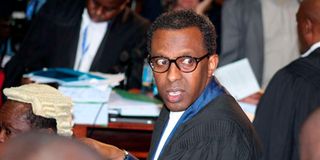Our hands are tied on the gender rule, MPs tell court

Lawyer Ahmednasir Abdullahi at Supreme Court in Nairobi on August 26, 2017. He is representing MPs before a five-judge bench at the High Court hearing 10 petitions filed in relation to the two-thirds gender rule.
What you need to know:
- Lawyer Abdullahi said compelling parliament to enforce the rule would require amendment of Articles 97 and 98 of the constitution.
- The bench, led by Justice Lydia Achode, heard that the order cannot be enforced on the current House.
Members of Parliament have told court that they have no powers to enact the two-thirds gender rule on elective positions and that they have all along been wrongly rebuked.
Through lawyer Ahmednassir Abdullahi, the lawmakers yesterday told the High Court that a legislation on gender quotas in the elective seats requires a referendum because it would interfere with the composition of parliament.
Mr Abdullahi said compelling parliament to enforce the rule would require amendment of Articles 97 and 98 of the constitution on membership of the National Assembly and Senate.
The senior counsel was addressing a five-judge bench hearing 10 petitions filed in relation to a controversial advisory given to President Uhuru Kenyatta by then Chief Justice David Maraga on dissolution of parliament for failing to enact the gender equality law.
In his advice to the President, the CJ had said the mechanism for the dissolution of parliament, irrespective of the consequences, is the radical remedy that Kenyans desired in order to have the political elite implement the transformational agenda of the constitution.
But, while urging court to quash the advisory, Mr Abdullahi said the constitution does not impose enactment of the gender parity rule on parliament alone.
Justice Maraga’s advisory
“Article 27(8) of the constitution provides that the state shall take steps to ensure that not more than two-thirds of members of all elective and appointive positions are of the same gender. It is a collective role. It is not exclusively assigned to parliament,” said Mr Abdulahi.
He also argued that Justice Maraga’s advisory could not be enforced because it was based on an order of the court dated March 29, 2017.
In the order, Justice John Mativo had directed parliament and the Attorney General to take steps to ensure the required legislation is enacted within 60 days from the date of that order.
According to Mr Abdullahi, that order was directed to the 11th Parliament whose lifespan expired on August 8, 2017.
The bench, led by Justice Lydia Achode, heard that the order cannot be enforced on the current House (12th parliament) because parliament has no perpetual succession.
Other judges sitting in the bench tasked with determining the legality of the advisory are Pauline Nyamweya, George Odunga, James Makau and Anthony Ndung’u.
Advisory opinion
“It is the membership of the House that creates a Parliament such that the mandate of each House lapses with the conclusion of its Constitutional term of five years. Parliament is not a perpetual organ and failures of the House cannot be transferred to its successor," he argued.
While stressing that Justice Maraga's advisory opinion is not binding and the President should audit it before acting as advised, the lawyer added that the retired chief justice took the simplistic and layman approach.
Attorney General Paul Kihara Kariuki and two other petitioners (Leina Konchellah and Mohsen Abdul) backed the argument saying the retired CJ failed to consider consequences of the advisory opinion.
Through principal State Counsel Emmanuel Bitta, the Attorney General told court that Justice Maraga failed to consider the public interest when advising for dissolution of parliament.
“For instance, CJ Maraga did not consider how the elections were to be conducted in the event of parliament's dissolution and the constitutional requirements that the election of parliament is tied to that of the president and county assemblies,” said Mr Bitta.
Lawyer Muturi Mwangi for the first two petitioners said the advisory opinion was based on fundamental errors of law. The hearing continues today.





